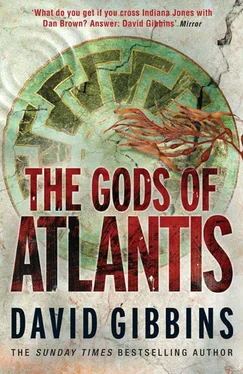David Gibbins - The Gods of Atlantis
Здесь есть возможность читать онлайн «David Gibbins - The Gods of Atlantis» весь текст электронной книги совершенно бесплатно (целиком полную версию без сокращений). В некоторых случаях можно слушать аудио, скачать через торрент в формате fb2 и присутствует краткое содержание. Жанр: Прочие приключения, на английском языке. Описание произведения, (предисловие) а так же отзывы посетителей доступны на портале библиотеки ЛибКат.
- Название:The Gods of Atlantis
- Автор:
- Жанр:
- Год:неизвестен
- ISBN:нет данных
- Рейтинг книги:3 / 5. Голосов: 1
-
Избранное:Добавить в избранное
- Отзывы:
-
Ваша оценка:
- 60
- 1
- 2
- 3
- 4
- 5
The Gods of Atlantis: краткое содержание, описание и аннотация
Предлагаем к чтению аннотацию, описание, краткое содержание или предисловие (зависит от того, что написал сам автор книги «The Gods of Atlantis»). Если вы не нашли необходимую информацию о книге — напишите в комментариях, мы постараемся отыскать её.
The Gods of Atlantis — читать онлайн бесплатно полную книгу (весь текст) целиком
Ниже представлен текст книги, разбитый по страницам. Система сохранения места последней прочитанной страницы, позволяет с удобством читать онлайн бесплатно книгу «The Gods of Atlantis», без необходимости каждый раз заново искать на чём Вы остановились. Поставьте закладку, и сможете в любой момент перейти на страницу, на которой закончили чтение.
Интервал:
Закладка:
‘I’ve heard that before,’ Jack murmured, thinking hard. ‘About the North Anatolian Fault off Turkey, at the site of Atlantis. It makes some meteoritic materials seem heavier.’
‘That reference on the pillar at Lixus,’ Jeremy interjected. ‘“Where the palladion becomes heavier.”’
Jack nodded, leaning over and staring at the map. ‘I take it there was no more contact.’
‘None whatsoever. Over the next few days hurricane conditions prevented search-and-rescue flights, and by the time the weather had cleared, the Nassau station commander deemed that there was little chance the crew had survived. They found the anchored minesweeper completely untouched, so assumed the Liberator must have gone down before reaching it, on a flight path that was meant to take them on a compass bearing of thirty degrees from the northern tip of San Salvador out to sea towards a coral ridge where the minesweeper was anchored. The aircraft was meant to attack at very low level, and the base commander’s log concludes that she may have clipped the waves in the rising wind and gone into the sea intact, accounting for the absence of floating debris. That was pretty unusual for the Liberator, which tended to break up on ditching, but the pilot, Squadron Leader White, was exceptionally skilled. The case was closed, but was briefly reopened nearly three weeks later, when a horrifying discovery was made almost three hundred nautical miles south-east of their target off the far end of the Bahamas chain.’
He pulled out another photograph and passed it to Jack, who took it and stared. ‘Jesus,’ he said quietly. ‘I’ve seen harrowing pictures of survivors of wartime sinkings who’d endured weeks at sea in lifeboats, but this is one of the worst.’ He stared for a moment longer, and then passed it to Jeremy. It was a low-level aerial photo of a one-man inflatable boat Jack recognized from the survival equipment his father had once shown him in the RAF museum at Hendon. The pontoons were smudged and criss-crossed with markings. Inside was a man, apparently naked, beneath a scrappy awning that seemed to have been rigged using his battledress and life jacket. He was in a foetal position, but his face protruded under one side of the awning, blackened and horribly ulcerated.
‘Surely he can’t have been alive,’ Jeremy said.
‘He was, just,’ Mikhail replied. ‘He was so dehydrated that his eyeballs had shrunk into his head. After his emergency rations ran out, he’d survived by fishing, making his first catch using pieces of his own flesh as bait. He’d been trying to drink his own blood. That’s what those markings on the pontoons are, like finger painting, all kinds of numbers and slashes that must have been his way of marking the days. The Catalina aircraft that spotted him managed to land on the sea and pick him up, and he was taken back to Nassau. By then, 111 OTU unit had departed and everything was winding down. In the hospital he was debriefed by the last remaining US intelligence officer on the base, an inexperienced man who had been sent out to take the records of the secret programme back to Washington for classified storage. His report from that day is in the file. The rescued airman had no chance of recovery and died that night, but during brief periods of lucidity he told the story that caught my eye when I unearthed that box in the archives almost fifty years later.’
‘Go on,’ Jack said.
‘His name was Flight Sergeant Brown. He was the rear gunner of Liberator FK-856. You won’t find his name or those of any of the other crew on the Commonwealth War Graves Commission website, as officially they were lost in a peacetime training accident. He was English but had emigrated to Canada to make a new life on the prairies. His parents had been killed in the Blitz and he had no other recorded family. He was twenty-six when he died. From the debriefing, it’s clear that the pilot was talking to the crew right up to the plane’s final moments, fighting to keep it level as it dropped towards the sea. The Boulton Paul rear turret on the RAF Liberators was a deathtrap at high altitude if a plane went down, but it often came away on impact in a forced landing, and that’s probably what saved him. He said there was a fire, but the pilot managed to ditch the plane nose-up, dousing the rear turret with seawater before the flames reached him and causing the turret to break away. The Liberator’s poor ditching characteristics were mainly a result of the lightly built bomb-bay doors, which tended to collapse on impact, causing the fuselage to fill up quickly and sink. He said that when he recovered consciousness the aircraft had disappeared and the pilot and other crew were nowhere to be seen. At that location the plane could well have gone down beyond the abyssal wall, where the ocean is more than a mile deep, and by the time the surviving crew had struggled out of their harnesses it may have been too deep for any hope of escape.’
‘So a fire caused the crash?’ Jeremy asked.
‘He claimed they were shot down.’
‘ Shot down? ’ Jeremy said in disbelief. ‘Nearly a month after the war had ended? No way.’
‘That’s what the intelligence officer thought. Flight Sergeant Brown was delirious, in and out of consciousness, and I think the officer recorded what I’m about to tell you only as a matter of getting something into the debriefing report before closing the file. Brown kept repeating that they had depth-charged a U-boat over a blue hole, but had been shot down. The officer noted in pencil on the side that he’d checked Brown’s personnel record and seen that before joining the pathfinders he had done a tour with Coastal Command and had a similar experience, flying rear gunner in a Liberator in 1943 that depth-charged a U-boat off Newfoundland but was hit by machine-gun fire and forced to ditch. The officer evidently thought that the 1943 ditching was a traumatic experience that came out in Brown’s delirium. Even the blue-hole story was dismissed out of hand. Blue holes are a striking feature of the Bahamas from the air, and the officer noted that from his position of boredom cramped in the rear turret for hours on end, Brown may have become fixated on them.’
‘You mean the sinkholes where so many cave divers die?’ Jeremy said.
Jack nodded. ‘The Bahamas land mass is a limestone plateau, and during the last Ice Age the sea level was over a hundred metres lower than it is today. Rainwater percolated through the limestone and created huge cavern systems that became submerged as the sea rose after the end of the Ice Age. Where the roofs of the caverns have collapsed, they appear as deep blue holes in the reefs, or as depressions where the limestone fragments from the ceiling have collapsed and filled up the caverns.’
Jeremy turned to Mikhail. ‘But when you read the file, you believed Brown’s story?’
Mikhail paused. ‘I’ve been to war, and I know about post-traumatic flashbacks. The streets and hospitals of Russia are strewn with veterans of the Afghan war who’ve never been able to deal with it. The trauma, the flashback, is rarely generalized or conflated. It isn’t a mishmash of memories. It tends to be one specific event, remembered in exacting detail.’
‘You’re saying that Brown’s account wasn’t a product of delirium.’
‘I’m saying that if he was traumatized by his U-boat experience with Coastal Command in 1943, he wouldn’t have seen a blue hole in the flashback. He would have remembered everything from that event in 1943, but not added other memories. And anyway, the trauma idea doesn’t ring true. The intelligence officer was assuming what we might assume, that experiences such as that 1943 ditching must have been traumatic. But that’s just wrong. Flying night raids over Germany was about the most terrifying thing a man could do in that war, yet Brown and his fellow crew had done it over and over again, and volunteered for more. There was a reason they were selected for the nuclear programme. They were the toughest of the tough. Some people just don’t get traumatized.’
Читать дальшеИнтервал:
Закладка:
Похожие книги на «The Gods of Atlantis»
Представляем Вашему вниманию похожие книги на «The Gods of Atlantis» списком для выбора. Мы отобрали схожую по названию и смыслу литературу в надежде предоставить читателям больше вариантов отыскать новые, интересные, ещё непрочитанные произведения.
Обсуждение, отзывы о книге «The Gods of Atlantis» и просто собственные мнения читателей. Оставьте ваши комментарии, напишите, что Вы думаете о произведении, его смысле или главных героях. Укажите что конкретно понравилось, а что нет, и почему Вы так считаете.












